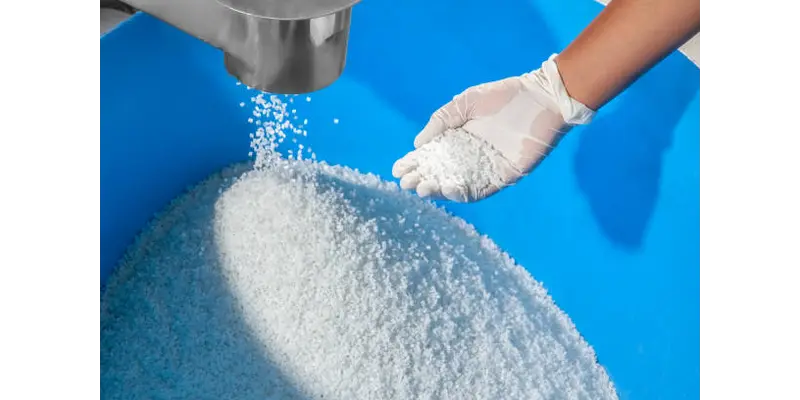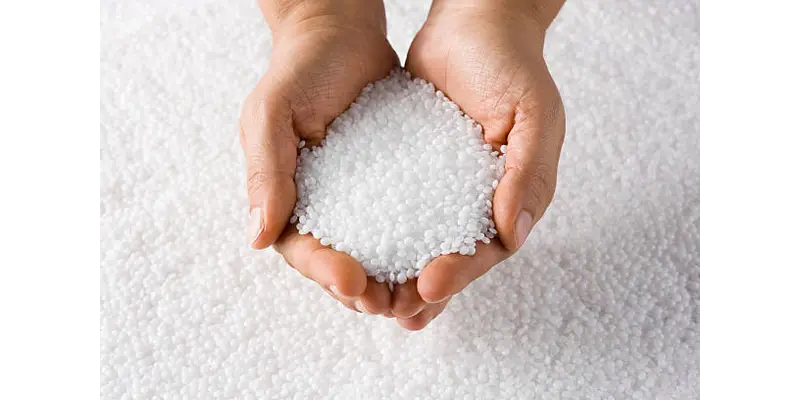Discover the remarkable advantages of expanded polystyrene (EPS) and its pivotal role in revolutionizing construction and insulation practices.
What is Expanded Polystyrene?
Expanded Polystyrene (EPS) is a rigid, closed-cell, thermoplastic foam material produced from solid beads of polystyrene, which is polymerized from styrene monomer and contains an expansion gas (pentane) dissolved within the polystyrene bead.

The production process of EPS products
The production of products made from EPS is done so in 3 steps
Step 1: Pre-Expansion:
A measured quantity of expanded polystyrene beads are put into a profoamer. Steam is circulated through these beads as well as a small amount (usually around 5% by weight) of petane which is a blowing agent. The beads are subsequently expanded by around 40 times. The expanded polystyrene beads are transferred into a storage hopper.
Maturing:
The material cools and the pentane liquifies which creates a partial vacuum inside the bead. Then,the expanded polystyrene beads are stored for between 12-24 hours to aid the maturing and to allow air to diffuse into the beads.
C: Final Forming:The beads are then reheated using steam and the mould is filled with a pre-measured amount of expanded beads. Steam is introduced into the mould circulating round the polystyrene beads, expanding them further by 10%. Finally,the steaming process stops and a vacuum is drawn to extract residual condensed water and heat. Additional water channels assist in cooling the mould.
How does it work?
Each solid polystyrene bead contains minute amounts of gas. When heat, typically in the form of steam, is applied, these gases expand, creating closed cells within the polystyrene, thus forming Expanded Polystyrene (EPS).
These expanded cells occupy roughly 40 times the volume of the original polystyrene bead. With a subsequent heat treatment using a mold, these large EPS blocks can be shaped into specific customized forms.
The use of expanded polystyrene
EPS has many different uses in life. EPS is favored for void filling and, at higher densities, serves as a lightweight alternative to traditional fill materials in road or rail embankments. Particularly in urban areas, EPS offers the advantage of reducing congestion and traffic by enabling the efficient delivery of large volumes of product compared to conventional hardcore materials. Furthermore, EPS is employed in specialized applications such as protecting foundations.
In addition, EPS finds widespread usage in construction applications, including walls, roofs, and floors, where its compressive strength can be customized to suit specific requirements. It is commonly utilized in systems like beam and block construction, underfloor heating installations, and beneath concrete floor slabs.

It is also widely used to protect food and avoid damage during various stages of food production and shipment due to its properties being unable to grow fungi and bacteria. Its low thermal conductivity is utilised largely in the fish industry for the packaging and transport of fish products, and also in the medical field to transport vital transplant organs.

Also, EPS is widely used in walls, roofs, and floors, where its compressive strength can be tailored for specific systems such as beam and block construction, underfloor heating systems, and below concrete floor slabs. It is also specified for void filling and, at higher densities, as a base for road or rail embankments where traditional fill materials are too heavy. The material has the advantage in city centres of reducing congestion and traffic with the delivery of large volumes of product more efficiently than hardcore.

Advantages of expanded polystyrene
Certainly! When considering the advantages of expanded polystyrene (EPS), it’s important to delve deeper into how these benefits contribute to various aspects of construction and insulation projects.
A: Energy Efficiency: EPS insulation significantly enhances the energy efficiency of buildings by providing excellent thermal insulation. This translates to reduced heating and cooling costs over the lifetime of a structure. Moreover, its lightweight nature facilitates easier handling and installation, further improving efficiency during construction.
B:Customization and Versatility: EPS can be molded into various shapes and sizes, allowing for tailored solutions to meet specific project requirements. This versatility enables architects and builders to design and implement innovative solutions, whether it’s for insulation, packaging, or decorative elements.
C:Durability and Longevity: EPS insulation is known for its durability and resilience against moisture, chemicals, and physical impact. Its ability to maintain performance over time ensures the longevity of building structures, reducing the need for frequent maintenance or replacement.
D:Cost-Effectiveness: The cost-effectiveness of EPS insulation is a significant advantage, making it an attractive option for both residential and commercial construction projects. Its affordability, combined with its energy-saving properties and long-term durability, offers excellent value for investment.
E:Sustainability and Environmental Benefits: EPS insulation contributes to sustainability efforts through its recyclability and energy-saving properties. The ability to recycle EPS reduces waste and conserves resources, while its energy efficiency helps reduce greenhouse gas emissions associated with heating and cooling buildings.
The advantages of expanded polystyrene (EPS) are manifold and indispensable in various industries, particularly in construction and insulation. EPS boasts exceptional thermal insulation properties, which significantly enhance energy efficiency and reduce heating and cooling costs. Its lightweight nature facilitates easy handling and installation, streamlining construction processes. The versatility of EPS allows for customization into various shapes and sizes, catering to specific project requirements with tailored solutions.
Moreover, EPS is renowned for its durability and resilience against moisture, chemicals, and physical impact, ensuring the longevity of building structures and minimizing maintenance needs. Additionally, EPS offers remarkable cost-effectiveness, making it an attractive option for both residential and commercial projects. Its sustainability is underscored by its recyclability and energy-saving attributes, contributing to environmental conservation efforts. In essence, the repeated focus on the advantages of expanded polystyrene emphasizes its multifaceted benefits that optimize performance, affordability, and sustainability across diverse applications.
Disadvantages of expanded polystyrene in construction
Despite its popularity, expanded polystyrene (EPS) insulation in construction comes with notable drawbacks. Challenges include vulnerability to compression, limited fire resistance, and environmental concerns due to its petroleum-based origin and non-biodegradable nature.
Additionally, EPS may attract pests and has a limited load-bearing capacity, requiring careful consideration and mitigation strategies during construction projects. Understanding these disadvantages is crucial for architects, builders, and homeowners seeking effective insulation solutions that balance performance with environmental and safety considerations.
Last Conclusion

In conclusion, the benefits of expanded polystyrene (EPS) as a versatile solution for sustainability and efficiency are evident across various industries. Its exceptional thermal insulation properties, lightweight structure, and durability make it an ideal choice for construction, packaging, and insulation applications.
